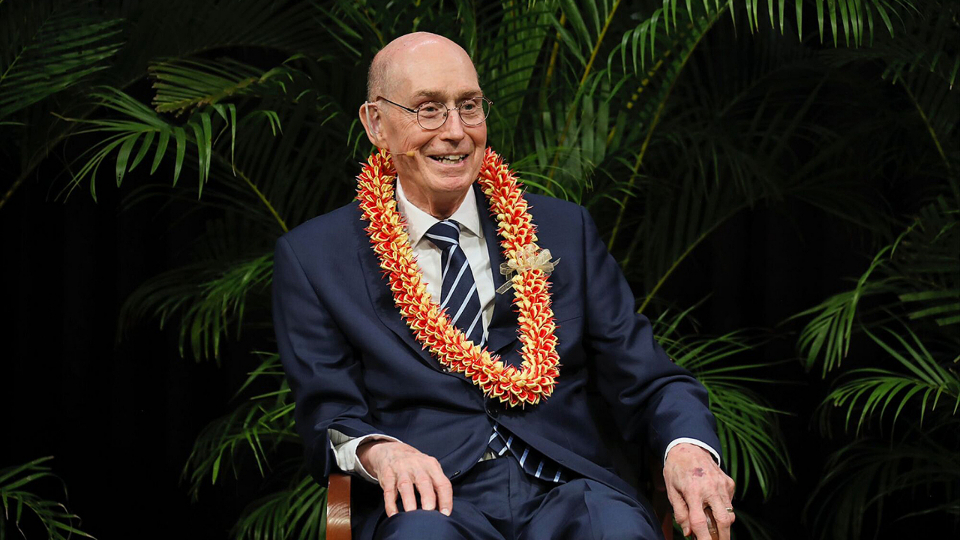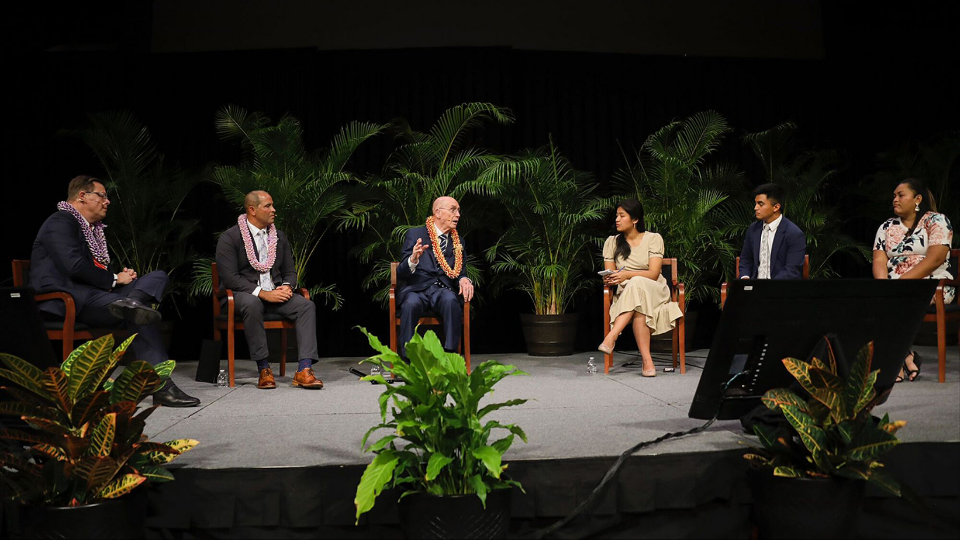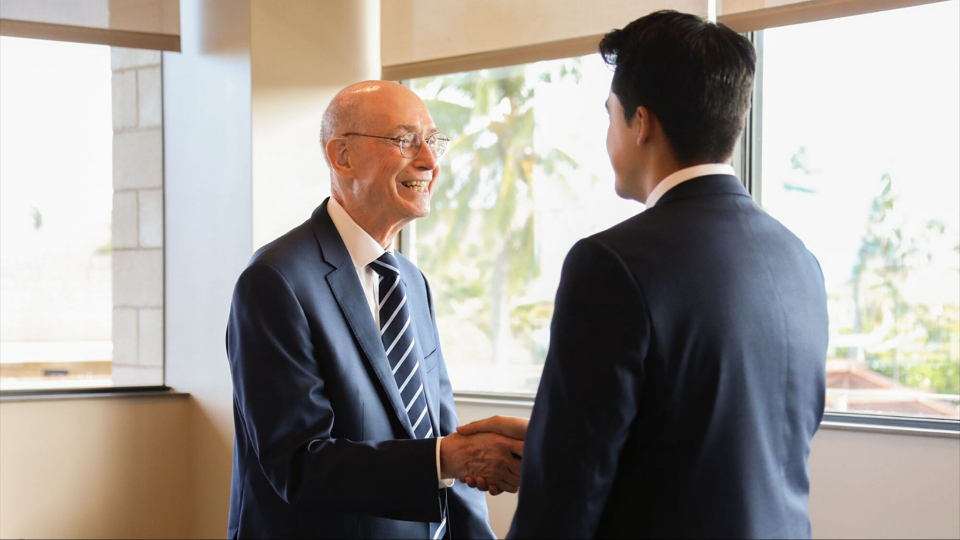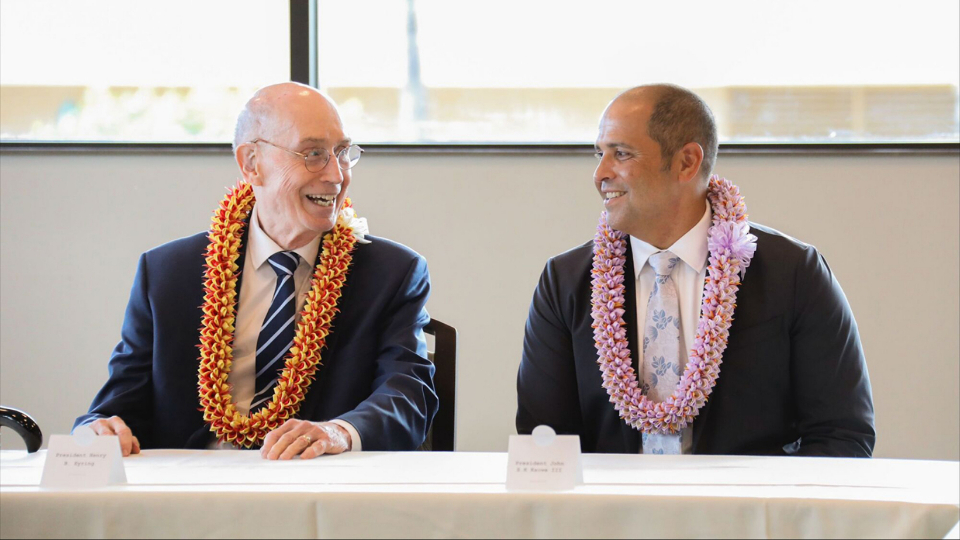
Eyring-BYU-H-2022
President Henry B. Eyring, Second Counselor in the First Presidency speaks during a campus devotional on Tuesday, November 22, 2022. Photo by Elise Mitchell, BYU–Hawaii.All rights reserved.
As President Henry B. Eyring, Second Sounselor in the First Presidency, and other leaders responded to questions posed by BYU–Hawaii students, a theme began to emerge: Each individual must learn to hear and act upon the voice of the Spirit.
Speaking to the university campus community during a question-and-answer format devotional on November 22, President Eyring said that his experience on the Laie, Hawaii, campus that day had been for him “a sacred time and sacred place.”
President Eyring noted that at the beginning of the meeting “a faithful prayer to Heavenly Father in the sacred name of Jesus Christ” had included a request for the influence of the Holy Ghost. “Our hearts were full as that prayer was answered for each of us,” he said.
In the many times he has visited campus through more than 50 years of full-time Church service, President Eyring said he has come to feel “that people here have lived to qualify for that gift [of the Holy Ghost]. That is why it feels to me as an environment of sacred time and sacred place.”
President Eyring returned to the Laie campus for the weekly devotional and was joined by BYU–Hawaii President John S.K. Kauwe III and Elder Clark G. Gilbert, a General Authority Seventy and commissioner of Church education, in answering questions specific to BYU–Hawaii’s diverse student body, which includes students from dozens of countries, especially throughout the Pacific.

Eyring-BYU-H-2022
From left, Elder Clark G. Gilbert, General Authority Seventy and Church commissioner of education; BYU–Hawaii President John S.K. Kauwe III; and President Henry B. Eyring, Second Counselor in the First Presidency, answer questions from BYU–Hawaii students Charlene Lee, Luke Dela Cruz and Foloi Sidow during the campus devotional on Tuesday, November 22, 2022. Photo by Elise Mitchell, BYU–Hawaii.All rights reserved.
Among other topics, the Church and campus leaders addressed questions about receiving personal revelation, students’ stewardship following a Church education and students going back to their home countries after gaining their degrees.
In brief remarks following the question-and-answer, President Eyring promised students that they would be blessed with courage and confidence as they exercise faith and pray “What will You have me do?”
“Listen for an answer,” President Eyring said. “Then do what He asks you. He already knows and wants what is best for you. Trust Him.”
Improving Personal Revelation
With their first “little baby” on the way, Luke Dela Cruz, a senior from San Diego, California, shared how he and his wife are trying to know what path to take next after graduation.
Dela Cruz quoted President Russell M. Nelson, who taught, “In coming days, it will not be possible to survive spiritually without the guiding, directing, comforting and constant influence of the Holy Ghost” (“Revelation for the Church, Revelation for Our Lives,”April 2018 general conference).
He then asked, “What counsel can you give us on how we can improve our prayers and receive personal revelation in the midst of life’s challenges?”

Eyring-BYU-H-2022
President Henry B. Eyring, Second Counselor in the First Presidency, greets BYU–Hawaii students prior prior to the campus devotional on Tuesday, November 22, 2022. Photo by Elise Mitchell, BYU–Hawaii.All rights reserved.
It’s important to put significant time and effort toward listening, President Kauwe said. “This world is so distracting and so loud.” It will require some work to find the peace and quiet necessary to hear Him.
Elder Gilbert pointed out that the talk that Dela Cruz referenced was President Nelson’s first talk as President of the Church. When he first listened to it, Elder Gilbert said he thought it was nice how the Prophet spent the first half of the talk introducing himself.
As he reread the talk, however, Elder Gilbert said he has realized that President Nelson is actually showing how, in every step of his life — work, marriage, where to live, how to do his work well, etc. — he took the decision to the Lord and sought revelation. “He gave us a guide,” Elder Gilbert said.
“Heavenly Father is going to let you have a repeated pattern of revelation if you’ll find that quiet place, go to Him, then listen and act when He tells you what to do,” he said.
President Eyring noted that in that talk, the Prophet spoke of how revelation is necessary for spiritual survival. “To me, he wouldn’t have used the word ‘survive’ if it was just about” how to have a great career or family, he said.
More than just making decisions about a job or where to live, there are challenges and hazards to circumnavigate in life such as what is true and what is not or what is right and what is wrong. “And you need to have the Holy Ghost,” President Eyring said.

Eyring-BYU-H-2022
President Henry B. Eyring, Second Counselor in the First Presidency, and BYU–Hawaii President John S.K. Kauwe III visit prior to the campus devotional on Tuesday, November 22, 2022. Photo by Elise Mitchell, BYU–Hawaii.All rights reserved.
Stewardship of Education
Foloi Sidow, a senior from Apia, Samoa, asked, “What would be one of your greatest pieces of advice to students who are graduating and going home to their home countries with their degrees?”
President Kauwe encouraged students to develop their skills to hear the will of God. “And be prepared to follow it.”
If that means a different plan, “that is OK,” President Kauwe said. If that means that there is some sacrifice involved, “that is OK. I would assure you and anyone else who is kind of wrestling with these decisions, that when you follow the Spirit and do what God wants you to do, that you will be happy and you will be blessed.”
Elder Gilbert encouraged students to think of their education as a stewardship, not just as a gift. “One of our university presidents once taught a famous Proverb saying, ‘We have all drunk from wells we did not dig and we have warmed ourselves from fires we did not build.’ We have a responsibility to give back to what we have received.”
Be prayerful, Elder Gilbert said, about “what is the stewardship I have for this education I’m receiving and how will I use it to bless others and my family and the Church and the communities that I’ll come back and serve in?”
The Savior is trying to prepare the world and the kingdom for His Second Coming, President Eyring said, and each has a role to play in that work.
He encouraged students to read their patriarchal blessings, then pray about it. “Go wherever you can build the kingdom of God and where you can touch people’s lives,” President Eyring advised.
That may be in one’s home country. It might not. “Pray hard about it. My guess is very often the Lord will say ‘Yes, it’s back where you came from. There’s something you could do there and it’d be best for your family.’ But that’s the way to pray — ‘Where can I go to be part of what You are doing, which is to prepare the kingdom of God for the day when the Savior will come?’”